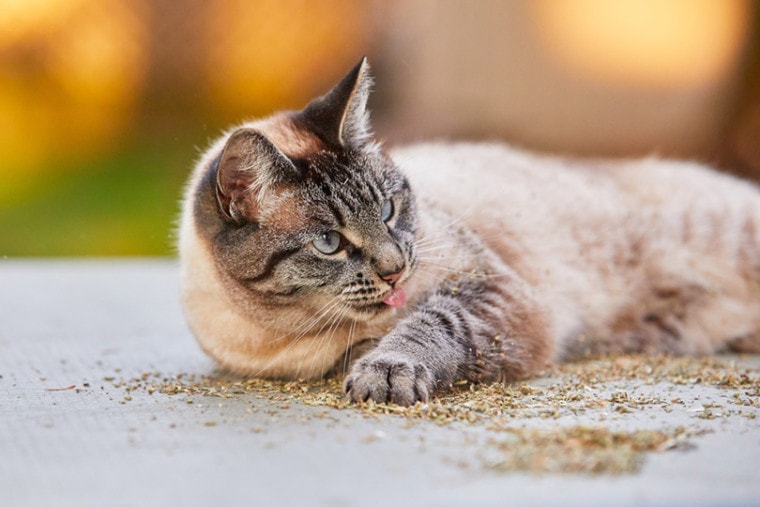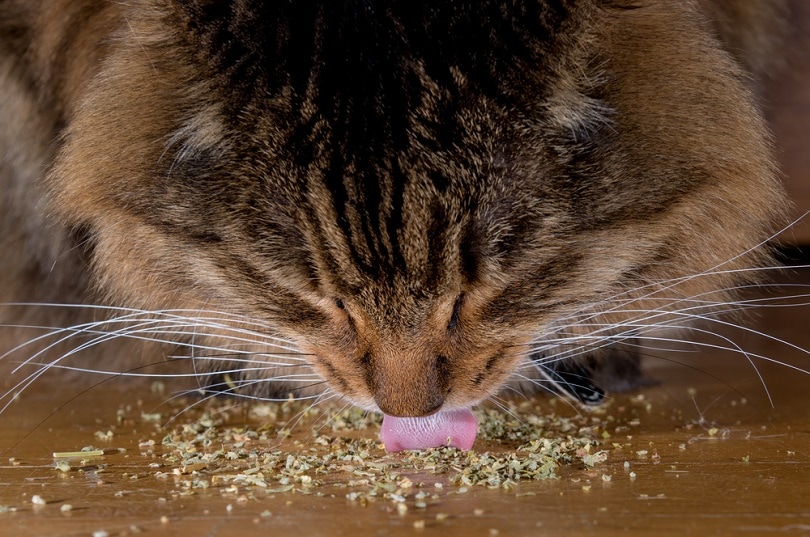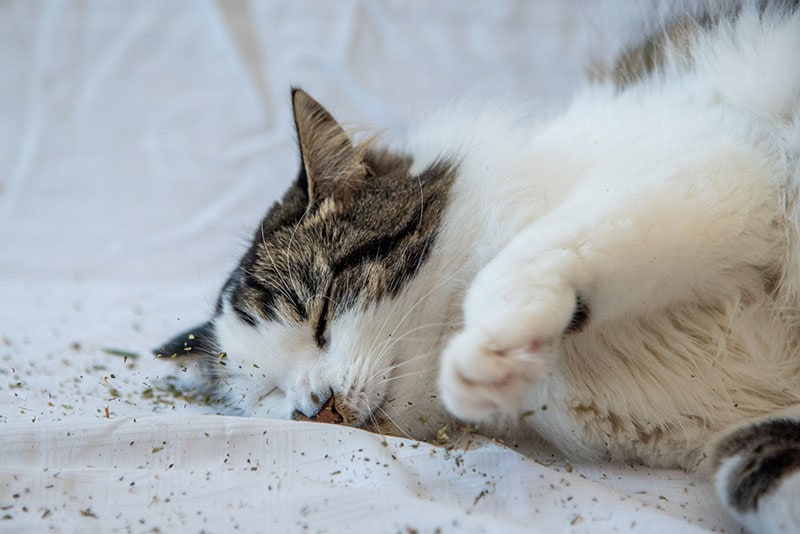
Cats and catnip have a well-known and interesting relationship, with some cats going absolutely bananas for the plant and some paying it no mind. Some cats won’t react to catnip at all because a cat’s reaction to Catnip is genetically determined, meaning that only around 70% of cats react to catnip.
However, there are also times when even the most catnip-crazy kitty will keep their reactions to a minimum when around dried or fresh leaves.

What Is Catnip Exactly?
Catnip, or Nepeta cataria, is a flowering herb of the Nepeta genus. Flowers of the catnip plant are small and pink with bright green leaves; these leaves and stems are typically dried and made into commercially available catnip for cats either in loose form, sewn into toys or bags, or even as a tincture for spraying.
Plants in the catnip family release oil when their leaves and stems are bruised, called nepetalactone. Cats will sniff these plants as they are very attracted to the smell; they’ll rub on them and bite them to release this oil, and the smell and taste will make them behave peculiarly.
A cat will roll over, rub, and wiggle on the plant, possibly to spread the oil on its fur. Catnip also has limited use on humans as a relaxant as well as a mosquito repellent.
The herb is native to Europe, Asia, and parts of China, and while it is widely available to plant and buy in garden centers, it can often be found growing in the wild. The flowers are also good for pollinators and attractive to butterflies.

What Are the Reactions Cats Can Have to Catnip?
Some cats’ reactions to catnip depend on the method of ingestion and the individual. If cats smell the catnip, it has a stimulant effect; after they smell it, their euphoric behavior if often referred to as resembling that of a cat in heat, such as:
The behavior of cats reacting to catnip is often the opposite if they eat it; if eaten, catnip affects the brain differently. The behavior shown if eaten can include:
How Long Does Catnip Last?
Usually, the effect of catnip lasts from 5 to 10 minutes, sometimes up to 30 on cats. It also has a cool-down of 30 minutes, and it won’t elicit a response until after this time, even if cats ingest it or smell it again.


Frequently Asked Questions
What Makes Some Cats React to Catnip?
Nepetalactone oil is released by the catnip plant and is inhaled by the cat. Once it’s inhaled, it binds to receptors in the cat’s vomeronasal organ, launching a reaction in the sensory neurons of the cat’s brain in the olfactory bulb. This signal is then processed and fired into several regions around the cat’s brain, such as the emotion center (the amygdala) and the control center (the hypothalamus).
While it seems complex, this chain reaction results in two important outcomes. First, the amygdala takes the signal and acts on the cat’s behavior, such as the silly zoomies some cats get. The hypothalamus then releases hormones and reactions as if reacting to sexual pheromones. This means that your cat reacts in a happy, relaxed, or excited way; they would respond the same way they would if around another cat in heat.
Some cats react as if they are in heat themselves, such as rolling around, presenting, and purring. However, the reaction is usually different if a cat eats the catnip. When eaten, catnip produces a sedating effect, relaxing and even providing some mood-lifting properties to cats.
Catnip can really enrich your cat's life, especially if you choose a fun, well-built catnip toy. Our favorite option is Hepper's Catnip Stick Toy, which offers sturdy construction, 100% organic catnip fill, and a great range of colors. These toys are handmade in the USA and feature bite-proof double bagging.
At Pet Keen, we've admired Hepper for many years, and decided to take a controlling ownership interest so that we could benefit from the outstanding designs of this cool cat company!
Why Do Some Cats Not React to Catnip?
Whether or not a cat is affected by catnip is determined by its genetics. Research has shown that approximately 70% of cats positively react to catnip. Studies have also concluded that the reactivity of cats to catnip may be hereditary and that an inherited trait will allow for the reaction to it.
If cats don’t have this trait, they won’t react to catnip at all; however, alternatives to catnip, such as silvervine, produce a reaction in these cats, with some more likely to respond to one than the other.
Interestingly it’s not just house cats that are affected by catnip. Lions, Tigers, Leopards, and smaller wild cats such as Ocelots also go crazy for catnip, exhibiting some silly behavior, such as rolling around, licking, and chewing at the plant. Kittens won’t react to catnip until they’re 3 to 6 months old; this coincides with the age cats reach sexual maturity.
Is Catnip Addictive to Cats?
Catnip is generally considered safe and non-addictive for cats despite new research discovering that catnip may act on a cat’s opioid system in its brain.
This system becomes immune to the effects of catnip directly after exposure, having around a 30-minute cool-down, meaning that it’s very difficult for cats to receive the same dopamine hit they would if catnip were addictive.
Can Cats Overdose on Catnip?
While an overdose of catnip is not possible, overeating catnip can produce some unpleasant gastric effects in your cat. Limiting the amount of catnip they can eat at once is a wise idea to avoid these horrible symptoms. Still, if they occur, the symptoms will usually resolve quickly and typically aren’t dangerous. Symptoms of eating too much catnip include drooling, vomiting, and diarrhea.
Are There Alternatives to Catnip?
If your cat does not react to catnip, the good news is that other plants contain the same oil that catnip does with the same effect, so they can potentially still benefit from the relaxing properties.
Silvervine, valerian, and Tatarian honeysuckle are three alternatives to catnip that produce the same pleasant effects in cats that seem to relax and enjoy them. However, each plant is slightly different, and different percentages of cats will react to it.
Silvervine is the best bet for cats that don’t respond to catnip, as approximately 80% of cats that try Silvervine will respond positively to it. Silvervine usually comes in the form of a dried stick or leaves. Cats may ingest it by biting it or smelling it.
Tatarian honeysuckle can grow naturally in yards despite being native to Siberia, as it is an invasive species. The honeysuckle comes in dried sticks, and around 50% of cats that try it will react positively to it.
Valerian Root has long been used as a relaxation aid in both human and veterinary medicine. It is known for its relaxing properties and can grow in your home garden; around 50% of cats will respond positively to Valerian Root, which is also found in calming pet preparations, so it may also affect other animals, such as dogs.

Final Thoughts
Most cats are lucky enough to benefit from the relaxing or stimulating effects of catnip. It’s a great enrichment tool, as cats can play with toys with catnip repeatedly for the same exciting, giddy feeling.
For those cats that don’t react to catnip, there are alternatives such as silvervine or valerian, which can also be found in cat toys or as loose leaves. The reason some cats don’t react to the herb may be genetic.
Featured Photo Credit: Pixel Cat Photo, Shutterstock







